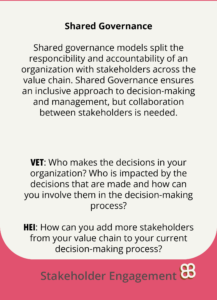Shared governance
Shared Governance refers to a collaborative and inclusive approach to decision-making and management, where various stakeholders actively participate and have a voice in shaping the industry’s practices, policies, and direction. It involves the sharing of power, responsibility, and accountability among different parties, including brands, manufacturers, suppliers, workers, users, and other relevant stakeholders.
In a shared governance model, decision-making processes are transparent, participatory, and equitable. It recognizes the interconnectedness of the fashion industry and the importance of engaging all stakeholders to address social, environmental, and ethical concerns. By involving diverse perspectives and expertise, shared governance aims to foster sustainable and responsible practices throughout the fashion value chain.
One example of shared governance in the fashion industry is the collaboration between brands and suppliers to establish and enforce ethical standards in garment production. This can involve creating codes of conduct, conducting audits, and providing training and capacity-building programs to ensure safe working conditions, fair wages, and respect for workers’ rights.
Another aspect of shared governance is engaging users in the decision-making process. This can be done through initiatives such as customer feedback mechanisms, surveys, and focus groups that allow users to express their preferences, concerns, and expectations regarding product sustainability, transparency, and ethical practices.
Additionally, shared governance may involve partnerships between fashion brands and non-profit organizations, industry associations, and governmental bodies to collectively address issues like environmental sustainability, waste reduction, and social impact. These partnerships can lead to the development of industry-wide initiatives, standards, and certifications that promote responsible practices and hold stakeholders accountable.
Case studies
Fair Wear Foundation
Fair Wear Foundation is an independent, non-profit organization that works with clothing brands, factories, trade unions, and NGOs to improve labor conditions in the garment industry. It follows a shared governance model where brands, factories, and workers collaborate to develop and implement fair labor practices, including fair wages, safe working conditions, and workers’ rights.
Sustainable Apparel Coalition (SAC)
The SAC is a collaborative effort among brands, retailers, manufacturers, and NGOs to promote sustainable practices in the apparel, footwear, and textile industry. It operates on shared governance principles, with members working together to develop and implement the Higg Index, a suite of tools that measures the environmental and social impact of products and supply chains.
Better Cotton Initiative (BCI)
BCI is a global non-profit organization that aims to transform cotton production by promoting more sustainable farming practices. It brings together stakeholders from across the cotton value chain, including farmers, ginners, traders, brands, and retailers, to establish standards and provide training and support for farmers to adopt more sustainable and responsible cotton production methods.
Fashion Revolution
Fashion Revolution is a global movement that advocates for transparency, sustainability, and ethical practices in the fashion industry. It encourages consumers to question and engage with brands about their supply chains and production processes. Fashion Revolution promotes shared governance by empowering consumers, workers, and industry stakeholders to demand accountability and transparency from fashion brands.
Sustainable Fashion Alliance
The Sustainable Fashion Alliance is an industry association that promotes sustainability and shared governance within the fashion industry. It brings together brands, designers, manufacturers, and industry professionals to collaborate on sustainable initiatives, share best practices, and advocate for positive change in the fashion system.
References
Beyers, Felix, Julia Leventon, and Harald Heinrichs. “Collaborative governance or state regulation? Endless efforts but little capacity for sustainability transformation of the German textile sector.” Environmental Policy and Governance 33.1 (2023): 56-77.
Yu, Dan, and Peipei Zhao. “Global Value Chain Governance of the Apparel Design Industry under the Background of Global Sustainable Economic Development.” Journal of Environmental and Public Health 2022 (2022).
